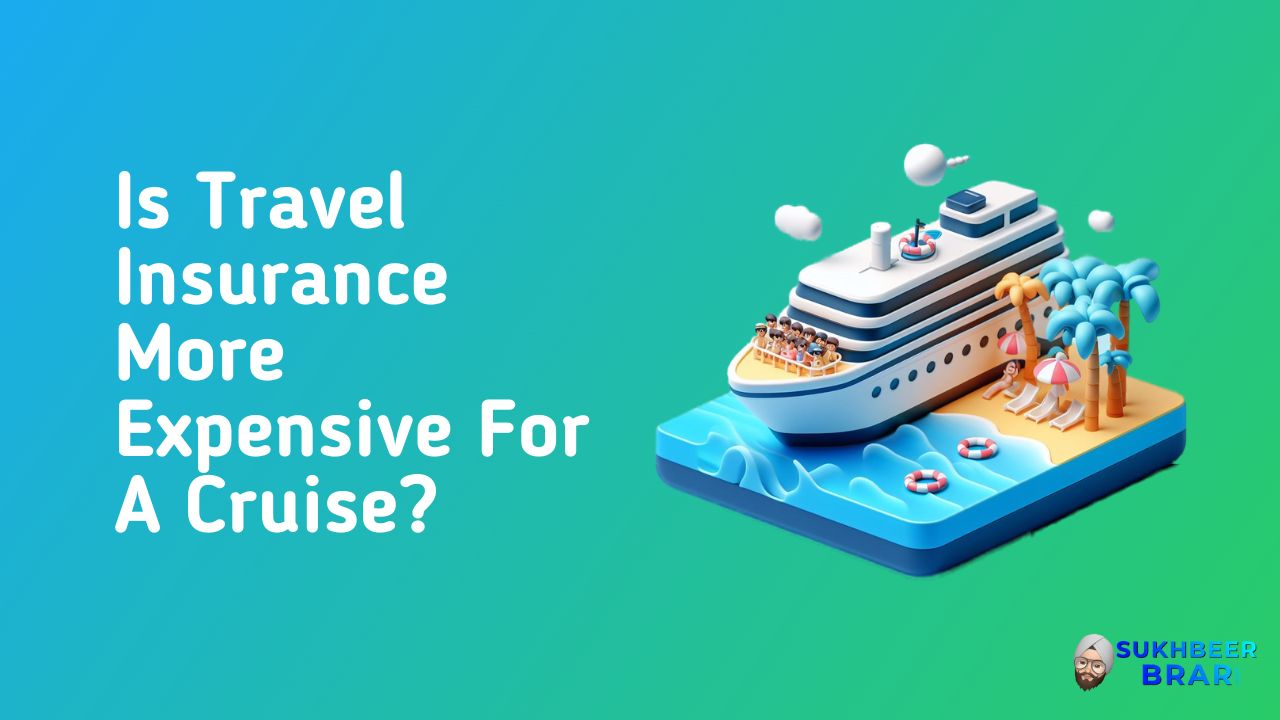Going on a cruise? You’ll definitely want to get travel insurance. But you may find that insuring your cruise costs more than insuring a similar land-based vacation.
Cruises have some unique risks and expenses that can raise the cost of travel insurance. Rough waters, missed ports, injuries on board, and illnesses spreading between passengers are just some of the issues that are more likely on a cruise. And if something does go wrong, the logistics and costs involved with helping you can be much higher than on land.
So in this article, we’ll look at the key factors that can make cruise insurance pricier. Understanding these reasons can help you find the best cruise coverage for your needs and budget.
Why Cruises May Cost More to Insure
In general, travel insurance for cruises costs more than for a regular vacation. There are several factors that contribute to the increased cost:
- Greater chance of medical emergency far from land. Being on a ship out at sea means you don’t have quick access to a hospital if something goes wrong. Evacuating someone by helicopter or diverting the ship to the nearest port can be extremely expensive. Travel insurance has to account for the added risk and costs of medical evacuations at sea.
Pre-Existing Conditions
Cruise travel insurance tends to cost more for people with pre-existing medical conditions. Insurance companies are more cautious about covering pre-existing conditions when travelers will be far from hospitals and emergency medical care for days at a time.
If you have an ongoing health issue or take prescription medications, your medical history could lead to higher premiums or exclusions for cruise trip coverage. Insurers may ask for a doctor’s note clearing you for travel or decline to cover claims related to your condition.
It’s important to be upfront about your health when applying for cruise insurance. Trying to hide pre-existing conditions can lead to denied claims down the road. Pay close attention to the medical questions on insurance applications.
Some policies have waivers allowing stable pre-existing conditions to be covered for an additional premium. But insurers will often flat out decline applicants with serious untreated illnesses planning to cruise.
The bottom line is cruise insurers are wary of large claims from pre-existing conditions far from port. Be prepared to pay more for coverage or look harder to find a provider willing to insure you.
Cost of Trip Interruption
Cruise trips tend to have a higher insurance cost than other vacations partially due to the higher potential cost of trip interruption. If a cruise gets interrupted mid-trip, the travel insurance policy may need to cover change fees, hotel stays, meal vouchers, and even chartered flights home. This can add up to thousands of dollars very quickly. With cruises often costing more upfront than a regular land vacation, the trip interruption costs will also be higher compared to a lower budget trip.
Insurance companies calculate your policy rate based on the total trip costs and maximum covered expenses. So when insuring a more expensive cruise vacation, the rate is boosted to account for the higher risk the insurance company takes on. If the vacation cost doubles, the trip interruption coverage and premiums essentially double too. While cruise insurance will cost more than insuring a road trip or budget flight, you do get more comprehensive coverage tailored to the unique risks that come with cruise travel.
Age Factors
Travel insurance companies often charge higher premiums for older travelers. This is because as we get older, we’re more likely to have pre-existing medical conditions that could require treatment during a trip. In addition, seniors are at greater risk for accidents and illnesses simply due to their age. For example, an older traveler is more likely to slip and fall than a younger, more agile person. They may also be more prone to fatigue and health episodes while traveling.
Insurance companies quantify this increased risk by basing premiums partially on the traveler’s age. A 70-year-old will almost always pay a higher premium than a 30-year-old for the same coverage, even if they are both healthy. Some companies set age cutoffs, such as charging higher rates for those over 65 or 75. Others simply increase the premium incrementally for each year over a set baseline age.
The gap in pricing can be significant. For instance, on an expensive cruise package, a 70-year-old may pay 50-100% more than a 50-year-old for an identical travel insurance policy. While this pricing seems unfair, the insurance companies base it on actuarial data and risk statistics.
For older cruise travelers, the higher cost of insurance may be worth it for the peace of mind and financial protection it provides if a medical issue arises. Seniors should comparison shop to find the most reasonable rate based on their age and health status. While they will likely pay more than younger travelers, the right policy can still offer valuable coverage.
Destination Risks
Cruises often visit multiple destinations, including some international ports that may be considered high-risk areas by insurance providers. Traveling to regions with potential political unrest, high crime rates, health advisories or the threat of terrorism can increase the likelihood of trip cancelation or medical emergencies. As a result, insurance for cruises making stops in volatile or unstable countries will typically carry higher premiums than cruises to safer, developed nations.
Even cruises confined to domestic ports can vary in risk and cost depending on the itinerary. Remote cruise destinations like Alaska and Hawaii involve longer transit times from major hospitals, raising concerns over emergency medical care access. Tropical cruise routes also carry added concerns about exposure to infectious diseases. Insurance providers account for these destination-based hazards when pricing cruise policies.
Trip Duration
Longer cruises typically have higher travel insurance costs than shorter cruises. A 1-week cruise is generally cheaper to insure than a several week or month-long cruise.
There are a few reasons longer cruises cost more for travel insurance:
- The longer the trip duration, the higher likelihood of something going wrong that requires insurance, like illness, injury, missed flights, etc. Insurance providers calculate and price in this added risk.
- Long cruises mean paying for more trip days and nights that may need coverage for delays, interruptions, or cancellations. More travel days equates to higher policy costs.
- On longer voyages, problems can escalate over time, turning a minor issue into a major one. For example, a sprained ankle early on could become too painful to walk on after several weeks, leading to medical disembarkation.
- Extensive cruises often visit remote locations with limited medical facilities. Medical evacuation in these areas is very expensive, so insurers charge more for long cruises going to such destinations.
- Many long cruises are to exotic international places. Medical costs and emergency travel arrangements abroad are more costly, again increasing insurance rates.
So when comparing plans, those embarking on multi-week or multi-month cruises should expect to pay higher premiums than short cruise travelers, simply due to the extended trip duration and increased chances of needing the insurance’s services. Carefully calculating risks and coverage needs for the longer voyage is advisable when choosing a travel insurance policy.
Cruise Line Reputation
The reputation and safety record of the cruise line can impact insurance costs. Higher-end cruise lines like Celebrity, Holland America, and Princess may have higher insurance rates as their trips cost more to replace if canceled or interrupted.
Mass market lines like Carnival and Royal Caribbean fall in the middle range. Their sheer size and number of passengers means more potential claims, increasing their risk.
Ultra-luxury lines like Crystal, Regent Seven Seas, and Seabourn often have lower insurance rates as their ships tend to be smaller and more nimble. Their focus on service also means fewer passenger incidents.
So while the base cruise fare may be higher on luxury lines, the actual insurance cost differences are marginal. The total trip cost is the larger factor, not necessarily the level of luxury. But perceived reputation and passenger demographics on more elite cruise lines can subtly influence policy pricing.
When Cruise Insurance Costs Less
While cruises often cost more to insure than land vacations, there are some cases when cruise insurance can actually be cheaper. Here are a few examples:
- Shorter cruises – A quick 3-4 day cruise is likely going to be cheaper to insure than a 2 week European land tour. Shorter trip lengths reduce risk exposure for insurers.
- Caribbean cruises – Traveling to the Caribbean on a cruise ship tends to be less risky than exploring developing countries independently. The likelihood of needing medical care or emergency evacuation is lower.
- River cruises – River cruises in Europe and elsewhere are generally pretty tame. You’re not venturing off into remote areas and risk levels are reduced. Insurers offer lower rates as a result.
- Domestic cruises – Taking a cruise that doesn’t leave U.S. waters, like Alaska or Hawaii, eliminates a lot of common travel insurance risks. There’s no need for emergency medical evacuation coverage and lower risks mean lower premiums.
- Loyalty discounts – Some insurance providers offer discounts for loyal customers or members of organizations like AAA. Look for ways to bundle your cruise policy and save.
So while cruises may cost more on average, there are still plenty of scenarios where cruise insurance can be very affordable. The destination, duration, cruise line, and policy details all factor into the final premium.
Conclusion
Taking a cruise vacation can be a fun and relaxing way to travel, but insuring that trip may cost more than other types of vacations. Cruise ships have unique risks like viruses spreading between passengers in close quarters, being far from hospitals if emergency care is needed, and weather-related disruptions that can cut trips short. The destination you visit and length of the cruise will also impact the insurance cost.
Older travelers and those with pre-existing medical conditions will likely pay higher premiums as well. But even though cruise insurance tends to be more expensive, it can give you critical financial protection in case you need to cancel your trip or if medical care is required at sea or in ports of call. Be sure to shop around and compare plans. Consider options like CFAR coverage so you can cancel for any reason. Then you can relax knowing that you planned ahead to be covered if the unexpected happens on your cruise.



